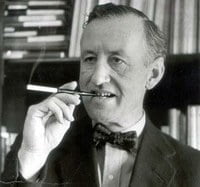
- Ian Fleming
James Bond was the brain child of British author Ian Fleming. Born to a wealthy family in 1908, Fleming was an undisciplined student, and often clashed with his teachers even when earning high marks for his schoolwork. After applying for a job with the Foreign Office and failing the entrance exam, his family connections landed him a job with Reuters News Agency. After that, he tried his hand at banking and stockbroking with unsatisfactory results.
It wasn’t until World War II broke out that Fleming found his true calling. Although he never saw combat, he held a series of important desk jobs, and was part of a team which traveled to the United States to meet with Colonel “Wild Bill Donovan” and helped write the blueprint for the new Office of the Coordinator of Information, which turned into the Office of Strategic Services. This, of course, was the organization which preceded the creation of the CIA.
Fleming found he had a love for espionage, and combined with his support for all things British, provided purpose to his life. But after WWII ended, he found himself at loose ends, and took a job with a newspaper. He hated the drudgery that went with the position, and often found himself daydreaming while admiring a picture of Jamaica near his desk. After several vacations to the island, he decided to move there permanently and, drawing on his family’s income, built a home for himself. He called it “Goldeneye.”
Fleming told friends he had always wanted to write a spy novel…and now with time on his hands, he did exactly that. Working at a feverish pace, and drawing upon his WWII experiences, he completed his first book, naming it “Casino Royale.” For his main character–who served as the author’s alter ego–Fleming later said he wanted to choose a name which was as boring and nondescript as possible. Looking around his library, he came across a reference book entitled “Birds of the West Indies” by an ornithologist named James Bond. And that’s where it all started.
Here was a character ahead of his time who bore more than a passing resemblance to the author himself: sex, violence, sadism, gambling, alcohol, snobbery, and misogyny were all topics the books indulged in. For his part, Fleming lived a hard life — smoking up to 70 cigarettes per day, drinking heavily, consuming a wide variety of pills, and chasing beautiful women whenever he got the chance.
Fleming went on to write 14 books. From the start, he was well aware of their commercial value. They soon came to the attention of an American producer named Albert or “Cubby” Broccoli.

- Ian Fleming’s James Bond novels
In 1958 Broccoli set up a meeting with Fleming, but on that crucial date was unable to attend due to the impending death of his wife. He sent one of his business partners to go in his place, who promptly ticked Fleming off by telling him his Bond books were only suitable for cheap TV shows.
Insulted, Fleming angrily walked out, and into the arms of another producer named Harry Saltzman who promised to treat him with more respect. Gregarious, not shy about voicing his opinion, and always seemingly chomping on a cigar, Saltzman was in many ways the quintessential deal maker. It wasn’t unusual for his staff to find him working multiple phone lines at once in his never-ending attempts to expand his empire and forge new business deals.
Soon, Broccoli and Saltzman became partners and struck a historic deal with Ian Fleming. They created a new company called Eon Productions, or “Everything Or Nothing”–a phrase taken directly from the author. They then went looking for a studio to bankroll their first film and found some executives at United Artists willing to put up $1 million toward the budget. This wasn’t a huge amount, but still reflected a solid commitment on their part.
The year was 1962, and Dr. No was chosen to be the first Bond movie. Since then, the James Bond franchise has become the longest continually running series in film history. There has been a total of 27 films associated with the character. Taken together, they’ve grossed a staggering amount of money – over $7 billion in revenue.
Ian Fleming died in 1964, a month before the third Bond film Goldfinger was released. But he was still able to witness the initial success his creation enjoyed. Even if he probably never dreamed the character would still be going strong over 50 years later.
If you look at any James Bond film, you’ll always see Ian Fleming’s name as part of the opening titles. That’s not an accident. It’s there by decree as a sign of respect for the author’s contribution to our collective culture. As one of Fleming’s friends noted: “Bond did him all right….he did reward Ian with everlasting life…”
Source: CIA Newsroom
China PR Agency



